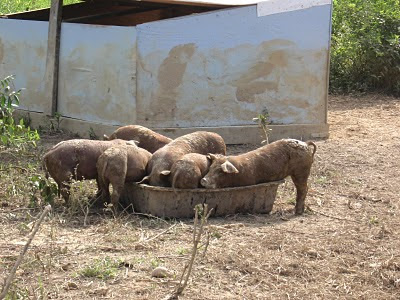Well, all but two of the piglets have made their way to new homes! Over the last two days, folks from as far away as Kentucky and North Carolina came to Ecotone to pick up these fine little hogs, some for breeding and some for feeding.
 Of course, catching them in the field is easier said than done. After having several sessions of pure farm folly - picture us running around the pasture trying to catch them by hand - I came up with the idea of a trap constructed with T-posts and pallets. The first person to come by saw the trap function in all its glory. With one drop of the door, I caught all the piglets. The second attempt, however, did not go as well. Here are some rules for piglet wranglin' that I came up with in the hours after the first piglets left, trying to catch the rest.
Of course, catching them in the field is easier said than done. After having several sessions of pure farm folly - picture us running around the pasture trying to catch them by hand - I came up with the idea of a trap constructed with T-posts and pallets. The first person to come by saw the trap function in all its glory. With one drop of the door, I caught all the piglets. The second attempt, however, did not go as well. Here are some rules for piglet wranglin' that I came up with in the hours after the first piglets left, trying to catch the rest.1) Porcine Patience: Patience is the first rule for dealing with pigs. You cannot force pigs to do anything they do not want to do. Period. Pigs are intelligent. They understand what you're up to, especially if they've seen it before. Now I cannot speak to the capacity for long-term memory in pigs, but I do know that it lasts for at least several days. The second round of piglets were surely aware of what was going on, refusing to go into the trap and making themselves scarce in the bushes. By this time they had also had plenty to eat, and so were that much less inclined to cooperate.
2) Time of Day: If you must wrangle pigs, do so at dawn or dusk. Trying to convince them in the heat of the day, when it's not feeding time and when their preference is to wallow in the mud, is futile. Approach porcine when they're hungry and when it's cool.
 3) Have a Plan: Do not simply start working with pigs without a plan. By the time our piglets left, they were a healthy 35 lbs. of pure muscle. If you grab one, have an idea about where you're going, and who's helping.
3) Have a Plan: Do not simply start working with pigs without a plan. By the time our piglets left, they were a healthy 35 lbs. of pure muscle. If you grab one, have an idea about where you're going, and who's helping.4) Do Not Attempt Alone: Following the previous rule, it is silly to try to work with piglets alone. The adult animals are slower, and know that you represent the Platonic forms of Corn and Soy. Piglets, however, see humans differently. To them we are unpredictable, strange, and scary. Though sometimes we show up with goodies too delicious to resist, often we show up with other, less pleasant, ends in view.
5) Respect the Sow: Most of these old-style pigs, raised outdoors on pasture, retain strong maternal instincts. Some even build elaborate nests of brush and sticks and whatnot. When attempting to retrieve piglets, treat the sows with the utmost respect. They weigh around 400 lbs. each, and are seriously committed to their piglets. Talk nicely, and try to explain what's going on. But if this doesn't work - and we all know reason has its limits - get the hell out of her way. No matter how sweet she is normally, liking her ears and belly scratched in the mud, when you're trying to get her babies, she's trying to get you. They go for your knees, and with a good bite could really do some damage. So respect her. Thank her. And you'll be back on her good side in a few days. With plenty of food.








